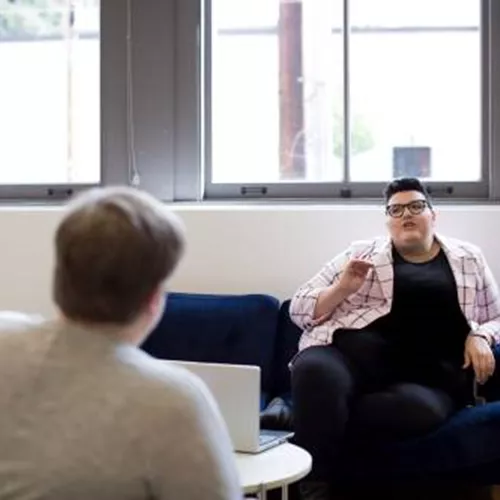Cognitive behavioural therapy (CBT)
Explains what CBT is, what it treats and how to find a therapist. Also includes guidance on how to try CBT by yourself.
What is CBT?
Cognitive behavioural therapy (CBT) is a type of talking therapy. It’s a common treatment for a range of mental health problems.
CBT teaches you coping skills for dealing with different problems. It focuses on how your thoughts, beliefs and attitudes affect your feelings and actions.
CBT is very good for helping me not listen to my self-critical voice, which is so damaging.
How does CBT work?
Watch our video to find out more about how CBT works, and whether it might help you.
I still get anxious. But CBT helped me gain insight and perspective. It was the start of my journey to recovery, though not the only part.
What is the theory behind CBT?
CBT is based on the idea that how we think about situations can affect the way we feel and behave. For example, if you interpret a situation negatively, you might experience negative emotions. And those bad feelings might lead you to behave in a certain way.
CBT combines two types of therapy to help you deal with these thoughts and behaviours:
- Cognitive therapy, examining the things you think
- Behaviour therapy, examining the things you do
CBT got me through a really tough time. From being suicidal and off work, to functioning again. It reintroduced structure to my life when I'd given up.
What does CBT treat?
CBT is a common treatment for many mental health problems and experiences, including:
- Anger problems
- Anxiety and panic attacks
- Bipolar disorder
- Depression
- Drug or alcohol problems
- Eating problems
- Hoarding
- Obsessive-compulsive disorder (OCD)
- Perinatal mental health problems
- Phobias
- Post-traumatic stress disorder (PTSD)
- Psychosis
- Schizoaffective disorder
- Schizophrenia
- Self-harm
- Sleep problems
- Stress
Sometimes you might be offered an adaptation of CBT to treat a mental health problem. Some adaptations of CBT for specific problems might have a slightly different name.
For example, you may be offered trauma-focused CBT (TF-CBT) to treat post-traumatic stress disorder (PTSD). Or CBT for physical health problems, if you experience a mental health problem alongside a physical health problem.
CBT is learning to stop the cycle of negative thinking. I still have relapses now and it's the one tool I use to get me out of the truly dark spots.
What are CBT sessions like?
In CBT you work with a therapist to identify and challenge negative thought patterns and behaviour.
You and your therapist might focus on what is going on in your life right now. You might also talk about how your past experiences have affected you.
CBT is usually a short-term treatment where you have a set number of sessions. This may vary depending on your local area or therapy service, and the reason you’re having CBT.
It can be daunting when faced with a list of things you can't do. But CBT helped me break up my goals into manageable chunks.
During the sessions
A typical CBT session may include:
- Working through exercises with your therapist to explore your thoughts, feelings and behaviour
- Agreeing some activities to work on in your own time
- Going over what you did in previous sessions and discussing what progress you’ve made
Outside the sessions
CBT can involve activities for you to do outside your sessions with a therapist. This might include filling in worksheets or keeping a diary.
You may need to commit your own time to complete the work over the course of treatment. You may also need to continue this after the treatment has ended.
You can find out more about how CBT works on the British Association for Behavioural and Cognitive Psychotherapies (BABCP) website, including information in different languages.

How CBT helped me find happiness
CBT has helped me build up resilience, gain self-belief and enjoy life as much as I can.
How can I get CBT?
Speak to your GP and they can refer you for CBT through the NHS for free. Some charities or workplaces may also offer free access to a CBT therapist.
In England, you may also be able to:
- Refer yourself via the NHS talking therapies programme
- Search for CBT and other talking therapies on the NHS mental health services finder
NHS waiting lists for CBT can be long, so you may decide to see a therapist privately if you can afford it. You can find accredited CBT therapists through the British Association for Behavioural and Cognitive Psychotherapies (BABCP).

CBT for depression and anxiety
I've noticed myself referring back to things I was taught in CBT.
You can also talk to your doctor or healthcare team about whether it might help to do some CBT by yourself. They might be able to:
- Recommend books, for example from the Reading Well series of self-help books
- Suggest worksheets or other resources that could be helpful for you to try
- Give you access to an online CBT service
Mental health apps
There are various apps available that you could use to help yourself day-to-day. But it's hard to know which ones are worth trying. Would you like some recommendations? We've put together a library of safe apps that meet our high quality standards.
I had previously tried CBT when I was first diagnosed, which I didn't find helpful. However the second time I tried it, it completely changed my life.
What if CBT doesn’t work for me?
Although some people find CBT helpful, not everyone does. If it hasn’t worked for you on one occasion it may still work at another time or with another therapist. Or it may be that other types of therapy or support suit you better.
See our information on what to do if therapy isn’t helping and alternatives to therapy for other options you could try.
I was encouraged to try CBT again with a different therapist. I like this one and am getting on much better. Which therapist you have makes a big difference.
This information was published in March 2024. We will revise it in 2027.
References and bibliography available on request.
If you want to reproduce this content, see our permissions and licensing page.














